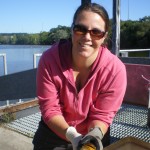 Joanna Y. Wilson, Professor and University Scholar
Joanna Y. Wilson, Professor and University Scholar
Educational Background:
- H.B.Sc. in Biology and Pharmacology, McMaster University
- M.Sc. in Biology, University of Victoria
- Ph.D. in Biological Oceanography, MIT and the Woods Hole Oceanographic Institution
I have taught in Biology 1A03 (Cellular and Molecular Biology), Biology 2A03 (Integrative Physiology of Animals), Pharmacology 3A06 (Introduction to Pharmacology), Biology 4C09/4F06 (Senior Project/Thesis) and Biology 726 Topics in Integrative Physiology. For the past few years, I have been mostly teaching Biology 3ZZ3 (Topics in Physiology) in fall term and Biology 3AA3 (Introduction to Pharmacology) in winter term.
I am an Associate Member of the Department of Psychology, Neurosciences and Behaviour (McMaster University) and a Guest Investigator at the Woods Hole Oceanographic Institution). I am Special Faculty at the University of Guelph for Integrative Physiology.
Current Lab Members
Mellissa Easwaramoorthy, MSc Candidate
Jack Salole, MSc Candidate
Max Hendershot, MSc Candidate
Hunter Herron, MSc Candidate
2024-2025 Undergraduate Thesis students: Emily O, Raveena Parse, Naiha Ali
Former Trainees (Graduate, Post-doctoral, and Technicians)
Lisa Stoa, Research Technologist, now in Chemical Engineering at McMaster University
William Andrew Thompson, Post-doctoral researcher 2022-2024; currently a PDF at Wilfrid Laurier University
Derek Alsop, Research Associate, 2016-2024; now a technician at Wilfrid Laurier University
Arpan Ghosh, Visiting MSc, 2023-2024
Andrea Michelle Murillo Ramos, Ph.D. 2017-2024. “The estradiol signalling pathway in Capitella teleta“. Andrea now works in science communication with the Company of Biologists
Shamaila Fraz, Post-doctoral researcher 2019-2022
Shemar Williams, MSc 2019-2022 “Developmental Health Effects of Metformin and Guanylurea on Larval Zebrafish (Danio rerio)”
Dwight Causey Post doctoral researcher, co-supervised with Richard Manzon at the University of Regina 2019-2022
Oana Birceanu, NSERC Post-doctoral Fellow 2019-2021. Oana is an Assistant Professor in Physiology and Pharmacology at Western University
Carly Graham, Postdoctoral researcher 2019-2021 co-supervised with Chris Somers at University of Regina. Carly is a faculty member at University of Regina.
Meghan Fuzzen, Postdoctoral researcher 2017-2020. Meghan is a researcher at the University of Waterloo
James McEvoy, Ph.D. 2020 “Diagnostic exposure of ionizing radiation and its long term effects” Co-supervised by Dani Dixon. James is a researcher at Flinders University
Victoria Restivo MSc 2020 “Effect of wastewater on the gut microbiome of rainbow darter” Co-supervised by Karen Kidd. Victoria works in environmental consulting (Risk assessment and toxicology).
Lana Shaya, Ph.D. 2019 “Characterizing the function and regulation of orphan CYP3 genes in zebrafish (Danio rerio)” Lana is a scientist with the Department of Fisheries and Oceans Canada
Shamaila Fraz, Ph.D. 2017 “Carbamazepine and gemfibrozil affect zebrafish reproduction”
Jessica Preston, M.Sc. 2019 “Effect of radiation in utero on mouse cardiovascular function”
Adomas (Adam) Kulesza, MSc 2017 “The combined effects of thermal and radiological stress on the embryonic development of lake whitefish (Coregonus clupeaformis).” Adam is in medical school
Shayen Sreetharan, MSc 2017 “Prenatal Ionizing Radiation Exposure Effects on Cardiovascular Health and Disease in C57Bl Mice.” Shayen is a PhD candidate at McMaster University
Michael Lim, MSc 2016 “Thermal, morpholine, and radiation stressor effects on the embryonic development of lake whitefish (Coregonus clupeaformis) and round whitefish (Prosopium cylindraceum). ” Mike is a PhD candidate at the University of Guelph
Kristine Hammill, MSc 2016 “The Effects of Parental Carbamazepine and Gemfibrozil Exposure on Sexual Differentiation in Zebrafish (Danio rerio)” Kristine is a senior regulatory policy and risk management advisor for Health Canada.
Charles Mitz, Ph.D. 2016, co-supervised with D. Boreham; “The cost of hormesis” Charles works for Golder Associates.
Chris Thome, Ph.D. 2015, co-supervised with D. Boreham; “The effects of thermal, chemical and radiological stressors on embryonic development in lake whitefish (Coregonus clupeaformis)” Chis is an Assistant Professor at the Northern Ontario School of Medicine.
John Eme, Postdoctoral Fellow John is currently an Assistant Professor at California State San Marcos.
Casey Mueller, Postdoctoral Fellow Casey is currently an Associate Professor at California State San Marcos.
Michal Galus, Ph.D. 2014 “Chronic Exposure to Environmentally Relevant Pharmaceutical Concentrations Effects Reproductive and Developmental Physiology in Zebrafish (Danio rerio)” Mike is a science officer for the Department of Fisheries and Oceans Canada.
Eugene Choi, M.Sc. 2014 ” The effects of chronic acetaminophen exposure on the kidney, gill and liver in rainbow trout (Oncorhynchus mykiss)” Eugene is a pharmacist
Lana Shaya, MSc 2014 “Expression of cytochrome P450 3C and 3B genes in teleost fish” Lana is a science officer with the Department of Fisheries and Oceans Canada
Chris Dejong, MSc 2014 “The cytochrome P450 superfamily complement in Capitella teleta” Chris is a bioinformatics analyst in biomedical sciences.
James Harskamp, MSc 2012 “Functional screening of cytochrome P450 activity and uncoupling by capillary electrophoresis” James is a teacher.
Nina Kirischian, MSc 2010 “Phylogenetic and in silico functional analyses of the cytochrome P450 families 2 and 4” Nina is an academic advisor at University of Toronto
Lucas Bowley, MSc 2010 “Endocrine disruption in round goby (Neogobius melanostomus) from Hamilton Harbour” Luke is a physician
Emily Smith, MSc 2009 “Cytochrome P450 drug metabolism and protein induction and inhibition in fish liver microsomes” Emily is a teacher
Marcus Scornaienchi, MSc 2009. “Functional characterization of zebrafish cytochrome P450 1 and 3A genes using heterologously expressed proteins” Marcus is a compliance and enforcement officer with Health Canada
